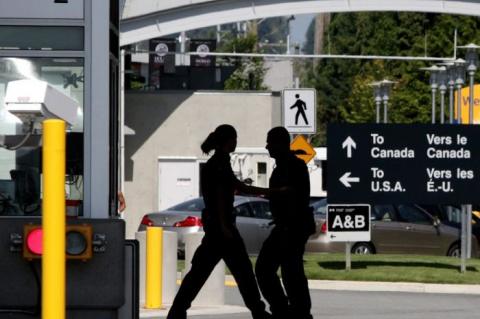For cannabis enthusiasts living in adult use states, long gone are the days of sneaking around with a dime bag in a coat pocket and worrying about whether the neighbors know you’ve got weed. But the sad truth is that, for millions of Americans living in prohibition or restrictive medical-only states, accessing safe and regulated cannabis is still a problem, writes Danielle Simone Brand.
But does that mean that those living without access to the regulated market are abstaining from cannabis altogether? Apparently not. A Gallup poll from last year surveyed American adults in all 50 states and found that 13 percent “regularly” or “occasionally” smoke pot. That number is likely higher in reality, as cannabis consumers in prohibition states tend to feel less comfortable self-reporting their habits.
So what’s a cannabis lover living in South Bend, Indiana or Twin Falls, Idaho to do? Although there are challenges involved in tracking the kind of behavior that people are reluctant to admit to pollsters and policymakers, we’ve gathered statistics, expert opinions, and anecdotes to paint a picture of the complicated realities of accessing cannabis from prohibition states.
Medical Refugees
For those who aren’t casual consumers, but medical patients, or parents of a medical patient, there may be few options, aside from relocating to a legal state. It’s hard to track cannabis-motivated migrations, but there are plenty of anecdotes about people in desperate need who’ve moved from prohibition states — and even other countries — to places like Colorado in order to get safe access to cannabis. This issue is the subject of a 2014 documentary hosted by Dr. Sanjay Gupta and part 2 of a CNN series on cannabis, which helped to bring attention to the plight of medical refugees in need of cannabis, and to change people’s minds about the plant’s medicinal value.
Recreational Relocators and Job Seekers
While “refugees” may not accurately describe this group, there are Americans who choose to move from a prohibition state to an adult use state because — at least in part — the cannabis policy is more lenient in their destination state. Some people just hate breaking the law, and others risk job loss or other serious consequences for buying and consuming cannabis. In an academic paper called “The Pot Rush: Is Legalized Marijuana a Positive Local Amenity?” researchers found that potential migrants to Colorado indeed saw legalized cannabis as a draw.
“Legalization plays into people’s broader view of what a state is, or what it’s like, ”Mason Tvert, vice president of communications at VS Strategies and former director of communications for the Marijuana Policy Project, told Civilized. Those who value a progressive atmosphere may take cannabis’ legal status into consideration when deciding where to live. Others — particularly recent college grads seeking entry to the industry — relocate to legal states for job opportunities.
Local Buyers
Some cannabis consumers are doing what they’ve always done: buying weed from their local guy (or girl), who sources from black market growers. Growers in the unregulated space, of course, come in all varieties. Some are steeped in the ethic of compassion, which motivates them to risk their freedom to provide medicine and enjoyment for others. These indie growers may abide by safe and principled growing practices; however, because they lack access to the legal testing regime, it’s impossible for an average buyer to know what’s really in the cannabis bought from an unregulated source.
Other illicit market growers and manufacturers are not so ethical. Pesticides, fungi, molds, e. coli, and other contaminants are regularly found in cannabis products sourced from the illicit market. Case in point: The vaping illnesses making recent headlines are mostly traced back to black market vape cartridges contaminated with toxins.
And while the illicit market still thrives in California — in no small part because of the lower cost of its products — consumers mostly have a choice. In prohibition states, on the other hand, options are far fewer, and users risk buying and consuming tainted products. Therein lies one of the most compelling arguments for legalizing cannabis: providing safe access.
Unwitting Customers of International Drug Cartels
The local guy or girl selling in cities and towns all across the U.S. could be sourcing from international cartels — which are also implicated in violence, the weapons trade, and human trafficking. Historically, cartels have taken 20-30 percent of their profits from cannabis smuggling, but the abundant supply of domestic, legal weed available today has prompted them to shift from weed to cocaine, opioids, meth, and drugs of similar ilk. Still, cartels remain involved in smaller ways in the illicit cannabis market.
Home Growers
Some in prohibition states are turning to home growing, though the risks remain significant in certain jurisdictions. In Idaho, where no cannabis-friendly legislation has yet passed, possession of even hemp-derived CBD could cause a run-in with the law. Though the 2018 Farm Bill did effectively legalize hemp in all 50 states, specific rules and regulations have not been laid out yet — prompting certain states like Idaho to delay adherence to the law.
You heard that right: In the golden age of cannabis, a person can still technically get arrested in Idaho for holding a CBD tincture even if it’s for an arthritic grandma or a sick child. Growing a THC-rich strain could cost you 5 years in jail and a $50,000 fine.
Canna-Tourists
Another option for those living in prohibition states is to partake in the weed tourism industry. Businesses have sprung up in legal states that cater to cannabis consumers or the canna-curious seeking a taste of the legal market. As the most established of the 11 adult use states, Colorado leads the way in this venture.
“Tougher laws tend to translate to more visitors," Mike Eymer, founder of Colorado Cannabis Tours, told Civilized. "Texas, the southeast, and northeast of the country are large portions of our base.” But vacations, as we all know, don’t last. For regular access, canna-tourism won’t meet the need.
Buying Through the Pipeline
Predictably, entrepreneurs are finding ways to turn on the flow of cannabis from adult use states to prohibition states. It’s illegal, but good business. It’s also the most solid choice for some consumers who want regulated product but don’t happen to live in the right state.
Daniel, a business owner in Indiana who prefers to use his first name only because he lives in a small town, told Civilized that he buys cannabis from a seller, who in turn purchases from Colorado dispensaries. That seller either drives the 16 hours to his home state with a car stocked full of cannabis, or he ships it back via USPS.
There’s risk involved for both buyer and seller in this scenario, but Daniel is quick to point out law enforcement’s changing attitudes, driven by the exponential growth of Indiana’s CBD market and by the evolving national discourse around cannabis. Even those who may not have ever understood the benefits of the plant before now see that there are many ways to consume responsibly, and police are therefore becoming more lenient. “People are a lot less afraid now because the consequences for buying or possessing are probably gonna be a slap on the wrist—at most,” he said.
However, Daniel is white. Throughout the country, black people often face much harsher penalties for cannabis infractions than their white counterparts do — even though national stats show that black and white Americans use cannabis in about equal percentages.
Excursions to Other States
Jamie, a high school teacher in Boise, Idaho, whose real name is withheld because of her job, says that she enjoys cannabis recreationally while hiking, biking, or doing yoga. “And in the evening,” she told Civilized, “it helps me get a good night’s sleep.” However, Jamie doesn’t feel comfortable seeking out an illicit market source. “I’ve never been good at asking around locally. It’s not my personality,” she said.
So, when the Oregon border town of Ontario opened its first legal dispensary in July, Jamie has regularly made the 100-mile round trip journey to buy flower and edibles. Even though it’s still illegal to bring the product back to her home state, she’s not alone. Idaho plates often fill the lot at the border town dispensary and business is good.
Across-state-lines cannabis commerce may be fairly common today, but Jamie is well aware of the risk. “I think twice about it,” she said. “If I were to get in trouble for this, I could lose my job.”
The Domino Effect
Jared Moffat, a campaign coordinator for the Marijuana Policy Project told Civilized that the organization was keen to be part of Michigan’s 2018 legalization campaign “because we understood that getting a foothold in the Midwest would break the perception that legalization was something limited to the West and the Northeast.” And that seems to have borne fruit; less than a year later, Illinois became the second Midwestern state to legalize adult use.
When one state legalizes, there’s an overall bump in media coverage. There are states where a certain newspaper may cover areas in other states, and so you see the dialogue of one state seep into the other,” MasonTvert told Civilized. He added that the national dialogue is heard everywhere and thereby contributes to changes in attitude and — potentially — in policy.
There’s even some indication of competition between states, said Tvert. Certain state governments are starting to pay attention to the legalization status of neighboring states and looking to craft similar policies. In New Jersey, New York, and Rhode Island, for instance, he observed "a lot of discussion about states in the region moving forward and needing to keep up and be competitive.”
Rhode Island’s state government is being spurred to action by the fact that neighboring Massachusetts has passed an adult use law. Legislators there worry that Rhode Island will be left out as a center of innovation — not to mention tax revenue. “If you want your state to be a leader in business, or to be the place where companies choose to locate, you need to be moving on this,” said Tvert.
He pointed out the fact that Colorado’s former governor, John Hickenlooper, did not seem to appreciate what the cannabis industry could bring the state. According to Tvert, Colorado’s current governor, Jared Polis, has made it a point to keep Colorado a place where cannabis startups wants to locate, or where a large multi-state operator will be based. “Governors want to attract business,” he said. “They want the 500-person factory or the 5,000-person headquarters in their state. And that’s no different with cannabis — or at least it shouldn’t be.”
Prohibition is a Failed Policy
Even though some form of prohibition persists in most of the U.S., Americans are still consuming cannabis. We’re smoking, vaping, eating, dabbing, and otherwise consuming it because it feels good or helps with intractable health issues; in any case, it’s far safer than alcohol and opioids.
Jared Moffat of MPP says that over the last few years “public opinion has definitively shifted in our favor.” The organization’s strategy is to pass as many reforms on a state-by-state level as possible in hopes that this will put pressure on Congress to act. “This year we’re seeing more support, and more votes for marijuana policy reform bills than ever,” he said. Even among Republican and conservative voters, Moffat added, support for medical marijuana polls very high.
Daniel, the business owner and cannabis consumer in Indiana, believes that the need for legalization is becoming more and more urgent in states with larger rural populations. “There are people who’ve done manual labor all their lives — who are in pain — and depend on opioids. But because of the crackdown, they can’t get them anymore. And cannabis,” he said, “could really help.”







